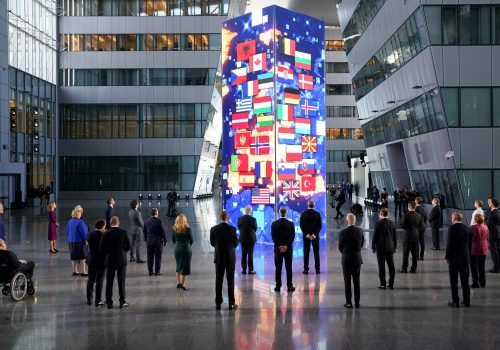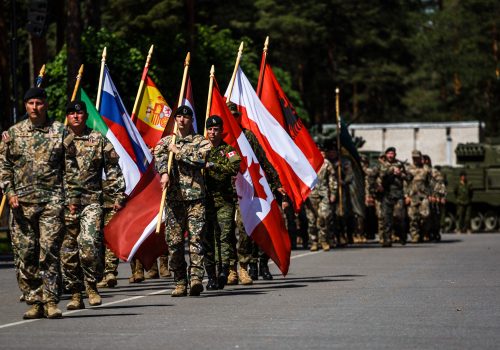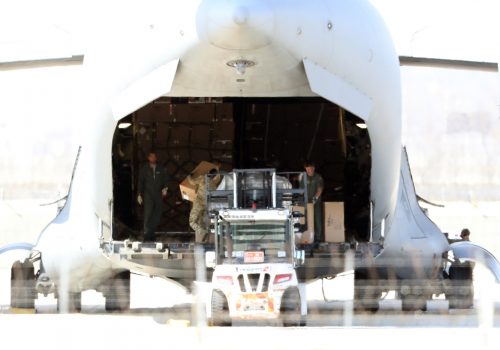The secret to NATO’s survival: Get political

NATO is a political-military alliance, but the political element has been lost in recent years, frustrating those such as the NATO 2030 Reflection Group who argue that the Alliance should be the premier forum for transatlantic policy coordination and crisis management. The Biden administration has a unique opportunity to reset NATO and take up the Reflection Group’s recommendations.
Why has NATO failed to be an effective political forum and what signs need to emerge from this week’s summit that NATO is making progress toward political effectiveness? There are six core areas to watch over the next eighteen months.
1. A coherent political-military strategy toward China
China presents the most pressing threat to the international system as we know it. With 1.3 billion people and an economy of nearly $16 trillion, China is a juggernaut that does not accept settled international norms (and laws) such as freedom of the seas and has very different ideas about human rights. The scale and scope of Chinese ambition, coupled with the reality that China is a major trading partner for many allies, complicates matters. Europe, for its part, has prevaricated on the matter but is finally starting to see the nature of the Chinese challenge. Coming out of the summit, where NATO for the first time took on the “challenge” of China in its communiqué, the Alliance must balance Russia—which remains a threat—with a new focus on Asia aimed at building modernized Indo-Pacific partnerships. China should be top of mind throughout all Alliance structures and a regular discussion point in all high-level meetings. The goal is a comprehensive political strategy that accounts for China being the world’s dominant economic power within a decade.
2. A renewed focus on arms control, both nuclear and conventional
NATO needs to get back in the nonproliferation and arms-control business that it used to do so well. Russia has repeatedly violated the letter of agreements and continues the development of new, ungoverned technologies as well as a total nuclear modernization—all in all a serious threat to NATO. China is also modernizing and expanding nuclear and conventional assets. The Alliance must continue to pursue its historic approach to arms control—a dual track of robust deterrence coupled with risk-reduction efforts. Progress in this area would allow NATO to return as the premier space for arms-control discussions, allowing for pan-alliance input. In line with the Reflection Group report, the Alliance should create a distinguished historical inquiry group to review NATO’s past approach to nuclear deterrence and détente and establish best practices going forward. The Alliance should confirm its adherence to the Treaty on Non-Proliferation of Nuclear Weapons while renewing nuclear-sharing agreements. On the public front, NATO should work with the expert community on outreach to inform public opinion about the need for NATO nuclear deterrence in the face of political interference that will (wrongly) attempt to paint NATO as the aggressor. The Alliance should push for reengagement with Russia but, following on the discussions above, should work to include China in all new arms agreements.
3. A more operational EU-NATO relationship
On paper, relations between NATO and the European Union (EU) seem to have progressed well. Joint declarations signed in 2016 and 2018 emphasize more productive relations and lay the groundwork for cooperation. But the working relationship has been less than ideal. After the political agreements are inked, implementation is lackluster and often left to lower-level staff, when political heavyweights dedicated to a better EU-NATO relationship are required to steer the ship to harbor. EU-NATO conflict and consternation were evident throughout operations in Afghanistan, for example. European leaders seem receptive to the idea of more collaboration, and for the first time in decades there is a dedicated trans-Atlanticist in the White House. The time is ripe to elevate this agenda. Renewal would include unequivocal support for European defense capacity that strengthens NATO and leads to more equitable burden-sharing, institutionalization of staff links through exchanges and partnership, and implementation of secure data-sharing, as well as a high-level panel to implement military deconfliction and reduce duplication of efforts. Finally, the renewal of the EU-US relationship should put a strong emphasis on resilience. As recent attacks against the United States demonstrate, NATO and the EU need to have the capacity to reduce the negative impacts of attacks, restore service, and improve strategies to counter cyberattacks from both state and non-state actors.
Subscribe for events and publications on transatlantic security
Sign up for updates from the Atlantic Council’s Transatlantic Security Initiative, covering the debate on the greatest security challenges facing the North Atlantic Alliance and its key partners.
4. A more capable Europe
NATO needs a new transatlantic bargain—no ifs, ands, or buts. Former US President Donald Trump’s view of NATO allies as unfairly taking advantage of the United States is a symptom of fraying transatlantic ties, not a cause. For decades, American presidents from both parties have been critical of European dependency on the United States. The issue is at a breaking point, and Europeans should utilize the goodwill of the Biden White House to step up capability development and strategic autonomy in a broader transatlantic framework to make Europe a more attractive security partner to the United States. European allies must emphasize, through actual progress, how their capability contributes to global peace and security. NATO’s headline goal for allies to spend 2 percent of GDP on their militaries grabs attention, but does little to improve actual capability. The allies should focus on capability development rather than raw expenditure.
5. Stabilization without intervention
Over the past thirty years, NATO has intervened both on the outskirts of Europe and over the horizon. Some engagements, such as the mission in Kosovo, have been perceived as successful, whereas others, such as the intervention in Afghanistan, suffer from a public perception of failure. The war in Afghanistan in particular was extremely costly in terms of blood and treasure, and presented severe coalition challenges. NATO countries’ publics show far less willingness to support such operations in the future. Renewing NATO as a political forum would include a proactive approach to monitoring and mitigating risk on NATO’s southern periphery across North Africa and into the Middle East—a chronic zone of instability and pressure on Europe. Intervention along this fringe is not advisable, especially when one considers more carefully the unintended consequences of such operations. But consistent, regular engagement, coming on the back of discussion and common policy formulation within NATO and between NATO and the EU, would set allies up to succeed in risk management on NATO’s southern periphery.
6. Tackling tech challenges
As Americans memorialized their dead and sat down for barbecues with family and friends over Memorial Day weekend, little did they know that one of the country’s largest meat producers was being hacked with ransomware. The matter hit home again when summer travel plans were upended for thousands as the Steamship Authority in Massachusetts succumbed to a cyberattack. Such attacks against public and private entities will only become more common, and NATO needs to be the forum where transatlantic strategy on tech sovereignty and innovation occurs. What norms and standards are required for a stable and productive future? The focus needs to be not just on disruptive technologies (and resilience, see above), but also on how to open US and European defense markets to foster multinational cooperation in research and development and to develop industry partnerships. The announcements in the summit communiqué on establishing a Defence Innovation Accelerator for the North Atlantic and a NATO Innovation Fund are welcome developments, but more is needed. NATO needs to be the forum where a doctrine of cyber responsibility is developed and deployed.
Developing the Alliance as a political actor via these six action points will not be easy, but if there is an administration that could do it, it is Joe Biden’s. Biden is the first US president since George H.W. Bush with an inherent tendency toward Atlanticism. Since 2000, the transatlantic space has endured reproach, apathy, and most recently hostility and neglect from the White House, all of which have been highly detrimental to transatlantic relations and greatly contributed to the decline of NATO as a political actor. But Biden is a natural trans-Atlanticist and is the last president of a generation that looked instinctively to Europe. One of his chief legacies could be setting a foundation for younger Americans to see Europeans, in a world full of competition for attention, as the allies they turn to first.
Jamie Shea is president at the Centre for War Studies at the University of Southern Denmark and a former NATO deputy assistant secretary general for emerging security challenges.
Michael John Williams is a nonresident senior fellow with the Scowcroft Center’s Transatlantic Security Initiative and an associate professor of international affairs at Syracuse University.
Further reading
Image: Protesters wearing masks depicting German Chancellor Angela Merkel, US President Joe Biden and NATO Secretary-General Jens Stoltenberg raise their hands painted red as they demonstrate against the NATO leaders summit in Brussels, Belgium, on June 13, 2021. Photo by Johanna Geron/Reuters.


